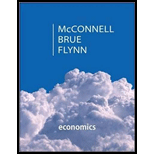
ECONOMICS W/CONNECT+20 >C<
20th Edition
ISBN: 9781259714993
Author: McConnell
Publisher: MCG CUSTOM
expand_more
expand_more
format_list_bulleted
Question
Chapter 4, Problem 9DQ
To determine
The impact of Carbon Tax and Cap-and-Trade strategy on greenhouse gas.
Expert Solution & Answer
Want to see the full answer?
Check out a sample textbook solution
Students have asked these similar questions
Published in 1980, the book Free to Choose discusses how economists Milton Friedman and Rose Friedman proposed a one-sided view of the benefits of a voucher system. However, there are other economists who disagree about the potential effects of a voucher system.
The following diagram illustrates the demand and
marginal revenue curves facing a monopoly in an industry
with no economies or diseconomies of scale. In the short
and long run, MC = ATC.
a. Calculate the values of profit, consumer surplus, and
deadweight loss, and illustrate these on the graph.
b. Repeat the calculations in part a, but now assume
the monopoly is able to practice perfect price
discrimination.
The projects under the 'Build, Build, Build' program: how these projects improve connectivity and ease of doing business in the Philippines?
Chapter 4 Solutions
ECONOMICS W/CONNECT+20 >C<
Ch. 4.A - Prob. 1ADQCh. 4.A - Prob. 2ADQCh. 4.A - Prob. 3ADQCh. 4.A - Prob. 1ARQCh. 4.A - Prob. 2ARQCh. 4.A - Prob. 3ARQCh. 4.A - Prob. 1APCh. 4 - Prob. 1DQCh. 4 - Prob. 2DQCh. 4 - Prob. 3DQ
Ch. 4 - Prob. 4DQCh. 4 - Prob. 5DQCh. 4 - Prob. 6DQCh. 4 - Prob. 7DQCh. 4 - Prob. 8DQCh. 4 - Prob. 9DQCh. 4 - Prob. 1RQCh. 4 - Prob. 2RQCh. 4 - Prob. 3RQCh. 4 - Prob. 4RQCh. 4 - Prob. 5RQCh. 4 - Prob. 6RQCh. 4 - Prob. 7RQCh. 4 - Prob. 1PCh. 4 - Prob. 2PCh. 4 - Prob. 3PCh. 4 - Prob. 4PCh. 4 - Prob. 5PCh. 4 - Prob. 6PCh. 4 - Prob. 7P
Knowledge Booster
Similar questions
- Critically analyse the five (5) characteristics of Ubuntu and provide examples of how they apply to the National Health Insurance (NHI) in South Africa.arrow_forwardCritically analyse the five (5) characteristics of Ubuntu and provide examples of how they apply to the National Health Insurance (NHI) in South Africa.arrow_forwardOutline the nine (9) consumer rights as specified in the Consumer Rights Act in South Africa.arrow_forward
- In what ways could you show the attractiveness of Philippines in the form of videos/campaigns to foreign investors? Cite 10 examples.arrow_forwardExplain the following terms and provide an example for each term: • Corruption • Fraud • Briberyarrow_forwardIn what ways could you show the attractiveness of a country in the form of videos/campaigns?arrow_forward
arrow_back_ios
SEE MORE QUESTIONS
arrow_forward_ios
Recommended textbooks for you
 Principles of Economics 2eEconomicsISBN:9781947172364Author:Steven A. Greenlaw; David ShapiroPublisher:OpenStax
Principles of Economics 2eEconomicsISBN:9781947172364Author:Steven A. Greenlaw; David ShapiroPublisher:OpenStax Principles of MicroeconomicsEconomicsISBN:9781305156050Author:N. Gregory MankiwPublisher:Cengage Learning
Principles of MicroeconomicsEconomicsISBN:9781305156050Author:N. Gregory MankiwPublisher:Cengage Learning


 Principles of Economics (MindTap Course List)EconomicsISBN:9781305585126Author:N. Gregory MankiwPublisher:Cengage Learning
Principles of Economics (MindTap Course List)EconomicsISBN:9781305585126Author:N. Gregory MankiwPublisher:Cengage Learning

Principles of Economics 2e
Economics
ISBN:9781947172364
Author:Steven A. Greenlaw; David Shapiro
Publisher:OpenStax

Principles of Microeconomics
Economics
ISBN:9781305156050
Author:N. Gregory Mankiw
Publisher:Cengage Learning




Principles of Economics (MindTap Course List)
Economics
ISBN:9781305585126
Author:N. Gregory Mankiw
Publisher:Cengage Learning